TRAD II TOUR 2004
Goisern takes a break
It's no wonder that Hubert von Goisern is beaming with a gold disc in his hand. Sold out venues from Linz to Kiel since the beginning of his Trad tour in February. A cheering audience at the two concerts on Tuesday and Wednesday in the Vienna Museumsquartier too. On these two days, on the most successful tour of his career, he was on stage for the last time for a long time in Austria. There are still eight concerts until the middle of September in Germany. At the end of November and beginning of December, there are another eight "latecomers". At one of these additional concerts in Mainz, 3sat will record a "Goisern special". Then there's a break. Two years, it's said.
The international commuter is looking for peace and distance from the stressful routine of the music business: album, tour, album, tour ... Goisern and band (Monika Drasch, Bernd Bechtloff, Max Lässer, Arnulf Lindner) have played about 100 concerts. So far around 110,000 people have seen the Trad tour. "On the one hand it's great, because you see how many people want to hear us and how many people like what we do. On the other hand, it saps your energy. There's barely any room for anything else," says Bernd Bechtloff, responsible for percussion in Goisern's band. Apart from soundmaster Wolfgang Spannberger, Bechtloff is the only one who has always been present since Goisern's return in November 2000. Back then, Hubert von Goisern had returned six years after he disbanded the Alpinkatzen and retired from the stage. In September 2002 came the album Iwasig (for which he received a gold disc from Virgin Music for 15,000 units after the first Vienna concert) and the two folk music albums Trad (March 2001) and Trad II (October 2003). The folk song interpretations of these two albums form the programme of the current tour. At the Vienna concert, Goisern came close to his wish of combining old and new, the close world of the mountains and the wide world elsewhere. However these different worlds are less merged than they form a unity which leads together what, at first glance, does not belong together: Goisern and Africa, Tibet and the Dachstein. Here they sometimes flow together like a wide river or crash against each other like a wild stream against a rock.
Hubert von Goisern to Vienna
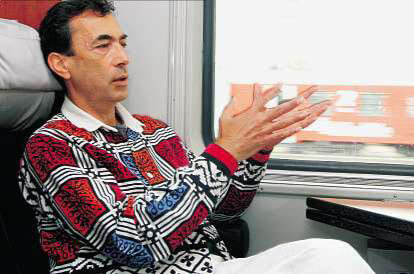
On the train with Hubert von Goisern.
The world musician on Jörg Haider, the good fortune of Hiatamadl and
why we are chimpanzees
An open-minded thinker. Hubert von Goisern has broken out from his little world and yet he returns time and again to Goisern. He had the family against him. "Music, stupid". Von Goisern was the black sheep, "a sounding sheep". He didn't give a damn about his job as a chemistry laboratory assistant and as a 37 year old, he'd rather learn yodelling on a motorway bridge. A cassette recording was the model, but of course he did not sing traditionally like the others, but rather in his way. He mixed up the scene with his musical solo efforts.
Now he is a bit loved by television again. He's travelling to the interview with Barbara Stöckl in Vienna by train. In a train compartment with Hubert von Goisern from Salzburg to Vienna. It's chance that he has arrived at the train station at all. He forgot his wallet at home, "the taxi driver recognised me fortunately. Now he's getting the money at home from my wife." With the mobile phone he borrowed from Monat, he informs Mrs "Finance Minister". He does without the mobile without delay. Goisern is a conscientious objector to mobile phones. But with lots of tries on the keyboard, he gets it going again.
Von Goisern was written off when he filled concert halls in 1994 and suddenly said "I don't want to any more". He'd had enough. "The greediness from everyone was too much for me. The musicians, the fans, the record company, everyone wanted something." Away from the stage, instead seven years in Tibet and other adventures. He picked a fight with the ORF and made himself rather unloved with his criticism of the all-powerful. His speech at the Amadeus Award was not shown in full.
And he is still singing. Very successfully, his current tour in Germany, Austria and Switzerland was stormed by the fans. On the 12th September, he is touching the keys of his accordion for the last time, then it's the end. No matter whether he would be sold out with his Trad II programme for another 10 years. Then all 360 degrees are open again, waiting, what comes. As always. "Chance is something very cool that I don't want to deny myself."
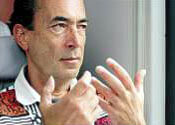
Is yodelling inherent?
The repetitive fast yodels, these coloratura yodels, I couldn't get on with them even when I was a kid. A real yodel must groove. Sometime I heard a recording on a cassette by a 12 year old girl. I thought to myself: "Wow, that's beautiful and it has a swing. But I'd never thought that I would bring it so far with my yodelling. But when you do something long enough, everybody learns it.
You trained on a motorway bridge, so that nobody would hear you.
That was in Regensburg. I was on tour and had time to practise. I noticed that you have to sing loud. It's best if you can't hear yourself at all, like on the motorway bridge. You feel the voice more. And I found out that the Tibetans do that too. They go to a loud waterfall to sing.
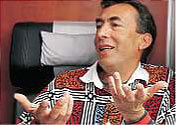 How
did you check whether what you had trained with was right at all?
How
did you check whether what you had trained with was right at all?
Well, if I like it, that's enough (laughs). It's no use to me when I do something that other people like and I can't get on with it. My first yodel was in Heast as nit, there I felt the aspiration to write a yodel that was totally different. And not like all the others which are all the same, like ears, one is a bit bigger, rounder, but that has happened too.
The yodel as a uniter of people?
Because it has no verbal message, you can concentrate more on the soul of the melody. When someone sings a language you don't understand, you can simply let yourself fall into this onomatopoeia, also a kind of yodelling. Yodelling is very powerful, you can't hide yourself. You can exhaust it by going over the ideal pitch and yodelling really high and almost screaming, or you go down really low so that it gets something throaty. It's like running. You pull the air in and your lungs start to burn, but it's cool. A balancing act. Even when I play the guitar, I like it when the guitar really shrieks - just as much as the fine quiet sounds on the guitar.
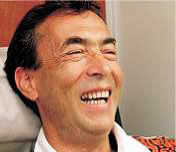 Have
you also been washed-up?
Have
you also been washed-up?
There were concerts where I almost couldn't sing at the end. There I said to myself: this is the last concert, then I have a week off. I also had to discard one song or another.
This time Hubert von Goisern hasn't climbed into the train with Goiserers. Black soft shoes, typical plains Indian things. He is no militant Green or car objector, although he does like to go to the river with his son and the junior catches fishes with his hands. Hubert skilfully links up with the modern. But the shirt and trousers in ethnic style answer the expectations, bright, African colours. When he speaks, he reflects carefully and lets the memories fly by like the trees and fields outside the train window. Salzburg - Attnang Pucheim - St. Pölten - Vienna. Not the world, but the world is not enough either. "Sometimes I have the feeling that I am at home everywhere and nowhere, like a gypsy. I carry the homeland inside me and when I forget it, I sing. And it can be that when I am in Tibet, or in Times Square, I get a longing for Goisern and the mountains there, the Dachstein and the lake at Hallstatt.
When he searches for peace, he goes to the Styrian side, to Toplitzsee and visits the landlord there. Sometimes he throws himself into the black water. Unrecognised. Hubert only comes when nobody is there. Although he wished for more fuss before. "When you have a greater audience and more media interest in Germany than at home, then that's bitter," he said a few years ago, "but I don't want to become Thomas Bernhard - whom I like - and say:''it's all shit".
Is "Hiatamadl" an emotive word? It has stuck to you for a long time, like Anton aus Tirol has to DJ Ötzi.
I've been playing Hiatamadl again for about 30 concerts.
But it was a curse for a long time.
It was really more good fortune than curse because it is simply a song that opened many doors for me. I played it 500 times and enjoyed playing it. But when we disbanded the Alpinkatzen in 1994, it was enough. It was important to me that I proved to myself that it could also work without this song. This year we are playing only folk songs and Hiatamadl fitted in very naturally. After ten years I've listened to the song again for the first time. And I was simply gone, how cool it was. It was really a success, I understood why it had been such a hit. It had a punch.
There were concerts where people constantly chanted "Hiatamadl, Hiatamadl".
I sent them out. It annoyed me that people demanded Hiatamadl after the first song. Sure, I could have played it at the beginning, but that was a highlight and belonged to the end of the concert. I said if they couldn't look forward to it, they should sit in the car and listen to it there.
How did people react?
That was the autumn tour in 1992 and 20% of people had come to the wrong concert. I said, you're welcome to leave and get back your money, but I don't want to concern myself with this crap and argue with you. From this 20%, half actually went. I have also stopped concerts due to other things. When people weren't quiet, or celebrated parties.
What is the best audience?
One that lets themselves in on the mutual experience. It's bad if some people have a different film inside, or get plastered. If the whole audience is like that, that's ok. We played in Cape Verde in front of 100,000 people, that was a huge party. They smoked, drank and it was totally normal.
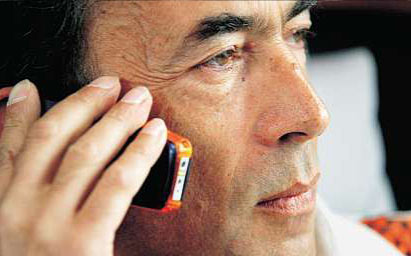 The
mobile phone rings. His management have an enquiry, straight afterwards,
Hubert completes an interview with the Vorarlberger Nachrichten, still
with the "rented" mobile. He briefly sets aside his Goiserer
dialect for the lady on the other end. But now a coffee, he even brews
a double in the dining car. On the way back, he even spills a flood of
coffee, but then happily lands in the carriage. Yeah, Hubert can laugh
too. He can even laugh hysterically, he sits opposite you like a little
boy. And happily slurps his coffee.
The
mobile phone rings. His management have an enquiry, straight afterwards,
Hubert completes an interview with the Vorarlberger Nachrichten, still
with the "rented" mobile. He briefly sets aside his Goiserer
dialect for the lady on the other end. But now a coffee, he even brews
a double in the dining car. On the way back, he even spills a flood of
coffee, but then happily lands in the carriage. Yeah, Hubert can laugh
too. He can even laugh hysterically, he sits opposite you like a little
boy. And happily slurps his coffee.
How big was the hit calculation with Hiatamadl?
The things either occur to me or not. I have also composed things without instruments, where I have been sat in the subway shaft. Then I have sorted myself out with a shred paper and quickly sketched what I have heard in my head. Sometimes I sing something on a Walkman too. But then you have a cassette with 150 ideas, until you have then found that - the bit of paper is still the best thing.
On 1st November 1994, there was the big break. Seven years away from the stage. Didn't the submersion also encourage the myth of the different being?
The demands became too much for me. From the audience, my fellow musicians, the management, the record company. No matter where I went, everybody kept on at me that I should continue as it was. I wanted to retreat and produce and not perform official duties.
Was there not a real break, where you simply did nothing and looked into the lake?
I travelled, to Tanzania and Tibet, from which projects arose by chance. It got to the point where I didn't dare to travel any more because an unbelievable work arose each time. I didn't touch my accordion and the other instruments for six years. It was hard to come back to them. But I did it intentionally because the fingers march by themselves and I wanted to break away from the muscle memory. I wanted to consider where I must hold again, so that I can develop new things.
A method in order to break the routine?
I must trick myself again and again in order to come into situations where I don't really know my way about any more, where I am then challenged. Otherwise I tend towards laziness.
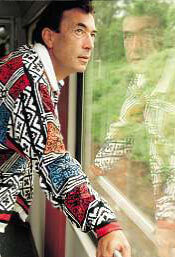 Hubert
briefly stretches his legs in the corridor. For a fan of the mountains
like him, the level fields of St. Pölten must be bleak. Not worth a stop
for a quick double espresso. Although the silence which dampens from
the furrows in the fields captivates him. Simply standing and looking
out of the big window and waiting.
Hubert
briefly stretches his legs in the corridor. For a fan of the mountains
like him, the level fields of St. Pölten must be bleak. Not worth a stop
for a quick double espresso. Although the silence which dampens from
the furrows in the fields captivates him. Simply standing and looking
out of the big window and waiting.
Your album Fön arose from the silence. What significance does silence have?
Silence makes music audible. If we didn't have silence, we couldn't be aware of sounds. Like light, which was first visible through the darkness. If the melodies have no breaks, they don't breathe.
Waiting is an important element for you. The meeting with the famous chimpanzee research scientist Jane Goodall rather coincidental too.
A friend of mine knows her. For years Jane has come to Goisern to celebrate Christmas with his family. And he simply wanted to bring us together one time.
What did you think of Jane Goodall?
She is a really wonderful person. A storyteller, and I just like such people because they have something to say. Listening to such a person is always cheering. Someone has defied so many obstacles and has gone their way. And it has gone well. Jane has a softness which is astounding for someone who can assert herself so. I have never heard her being loud. I have experienced something different with the Dalai Lama, who is a very positive person in the face of the political situation in Tibet. He can have strong feelings about something he doesn't like. It is a cool energy he lets out. I am happy that I am not the only one who has his off-times. Coping with life when everything's going well is no art.
Are you an optimist?
A calculate pessimist, but an optimist by nature.
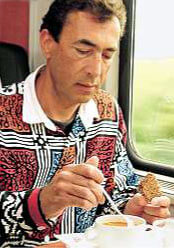 "Minestrone,
please." No room in the dining car, so slurping soup in business
class. "No photos," he says. He draws the boundaries to his
person very strictly. He only rarely gives interviews and home stories
which also show the bathroom are categorically refused. Hubert puts the
white plastic spoon between his teeth and plays with it like a blues
harp. Pleng, pleng!
"Minestrone,
please." No room in the dining car, so slurping soup in business
class. "No photos," he says. He draws the boundaries to his
person very strictly. He only rarely gives interviews and home stories
which also show the bathroom are categorically refused. Hubert puts the
white plastic spoon between his teeth and plays with it like a blues
harp. Pleng, pleng!
The significance of the CD is always waning, the live music is more important.
I actually think the development is very positive. On a CD no music is at the top, live music is the only music, for me, records are a copy of what music really is. The wonderful thing with music is that you play a sound, and it can be the coolest sound to have come from you, but once it is played, it's gone. And the most terrible mistake can happen, but it's gone. The mutual experience, that is really music, when two, ten thousand people get into the same groove.
Jörg Haider also comes from your homeland and he advocates the preservation of folk. A joining element?
Apart from the fact that we are both from Goisern, I can't think of any common ground.
What does Jörg Haider make you think of?
There is the expression: there must also be such people. But it is a shame that there must also be such people. Because I think that he represents what has unfortunately possessed many people. You can't simply ignore it, it won't go away like that. But I think it's basically good that he is reduced in his effect on Carinthia. He has been demounted in federal politics and the imminent horrors we still had a few years ago are now avoided. I am very happy about that. I was never one of those who said now I'll emigrate, because I have a much too positive opinion of Austria and the Austrian people. He has passed his zenith and that's good.
How can one see the political world picture of Hubert von Goisern?
In my world picture there are no boundaries, no religions, no envy. But nevertheless I believe that religions are important and also parties stupidly, because we could not organise ourselves politically.
You organised table tennis tournaments for blacks and white in South Africa?
I organised them because it was straightforward and organisable and because I wanted to lay down measures to unite people. The subsequent party suffered because not once had people been able to drink together. The whites already knew why they did not allow whites and blacks to drink alcohol together. You don't drink apart, but together.
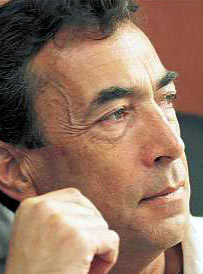
Von Goisern observed chimpanzees with Jane Goodall for a long time. His lesson: Our society is chimpanzee-like." There is the story of two ape communities who fought a war for so long, until they systematically exterminated themselves. Down to the last ape. "We have much more from the apes than we like."
Is there a danger that you will hang up your harmonica?
Music is a gift, music is like a drug for me. Perhaps that is the reason why I keep having a break, in order to avoid becoming a total junkie.
What do you expect from life?
I don't think it's good if I empty my head. Chance needs time. You must then have this leisure to follow it. We are taught that distraction is something bad, that sloppiness, laziness or even Beelzebub lie in wait there.
Hitherto everything has been a success for you, even when you follow chance.
Many things were tough. But then the result justified it. Everyone should be a bit crazy. But not when it's about power play and territorial boundaries. Where would we be then? In the Stone Age perhaps.
Hubert von Goisern shakes hands and disappears again into the mists of the Westbahnhof, Gombe or Tibet.
Zeitgeist: Hubert von Goisern "My credo is openness, you must be open to everything"
What do you associate with Carinthia?
I really like coming to Carinthia, especially to go skiing. The Salzkammergut, where I come from, is very similar in its landscape and feeling of being alive.
How do you see yourself?
That always depends on my mood. Sometimes I think I'm pleasant, then I feel like an arduous contemporary again. Unfortunately, giving a good picture is not always successful.
Do you see yourself as a zeitgeist?
We are all zeitgeists. People are spiritual beings, who float through time. Some are old-fashioned, others are more avant garde and again others are planners who don't get on in the time in which they live.
What does the title of your current album Trad II mean?
Trad stands for the English word "traditional", that is folk tunes. Folk tunes are works whose authors are unknown. On Trad II, things that have been verbally handed down are dealt with, that is the "hits" from the day before yesterday. Each song goes its way, takes another form and is subject to a constant change.
Which themes are dealt with on Trad II?
I can't restrict it to a common denominator. Everybody should listen to the album themselves. I can't restrict it, there's no listening guidance from me.
Where do you find the stimulation for your songs?
For one, I listen to a lot of music. When I like something, it remains in my memory and then comes up again sometime. Then it can be that I let it be incorporated into a new piece. Other ideas come totally from me. The most important thing is to be an attentive and patient listener.
What is the message of your lyrics?
I don't demand any message. Each person should take what is important for them.
Do you feel you belong to "Austropop"?
Yes, somehow, because I come from Austria. My musical - the alpine - tradition is something like modern folk music. And that comes close to pop music.
What do you think of the short life-span of pop songs?
We are all short-lived. Wanting to design something eternal would be foolhardy. Even of the ancient Egyptians, only "dead piles of stone" remain today.
In your music, you combine the exotic with the native...
I have been influenced by ethnic folk music through my travels. That is simply an awareness of music and of life. My credo is: openness. You must be open for everything that comes along. I was in North America for two and a half years. There is no constraint of tradition there as we know it, except with the Indians. The people are open for everything. I really liked this attitude to life. And the people have few reservations, I think that's great.
You're a globetrotter...
I love travelling. New situations sharpen the senses. The unknown demands new definition of positions.
What does the term "homeland" mean to you?
I have two definitions: on the one hand it is memory. That doesn't necessarily have to be positive. Someone can have bad memories of their childhood through war or violence. Nevertheless, these memories are somehow a piece of homeland. On the other hand, any place where you get involved is homeland. As soon as you leave the passiveness behind you ("I don't like that"), it becomes your homeland.
Where is your homeland?
Currently in Salzburg. My wife and my children live in the city and "coming home" is really one of the nicest feelings I know.
Music unites people all over the world
An interview with the Austrian musician Hubert von
Goisern
- two open air concerts at the Passau Domplatz on 1st and 2nd August
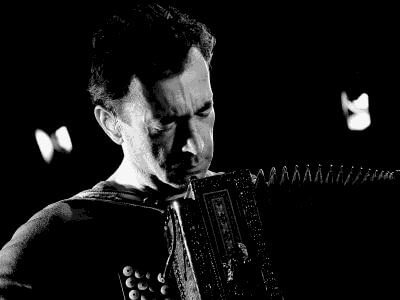
The Austrian musician and globetrotter Hubert von Goisern sees to it that traditional folk music is given back its dignity. Simple protection of the old tunes is not enough for him - the world musician re-invents traditional music time and again so that it can survive. After many journeys through Africa and Tibet, he has musically returned to his Austrian homeland with his latest CD Trad II. On 1st and 2nd August, he makes an appearance at the Passau Domplatz. In an interview with Anna Ausserer, he talks about tradition, homeland and how music can soothe the soul.
You recorded the Trad II CD up on the 2100m high Krippenstein in Austria. The transport of the equipment by cable car alone was very expensive. Why all the expense?
We wanted to record the album in an ambience that allowed us great concentration, because there is just no distraction where you are and you are much more dependent on each other than in a studio where people come and go. Then I also really liked the idea of not recording in a studio, because that's always a bit daunting. Up in the mountain scenery, everything was much freer and I think it was worth the expense.
How do audience in Austria differ from those in Germany and Switzerland? Who is more enthusiastic?
I like playing outside Austria. The further you are from Austria, the greater the openness and the scope of interpretation of what we do. The people at home partly know my songs and often connect a personal story with them. They know the old folk songs from before and often don't understand why I play them this way or that, why I leave out a verse, or give them a completely new face. There are quickly parameters of comparison and the benchmarks are stronger, the nearer to the epicentre you come. Abroad they approach the music without prejudice, because it's really exotic.
What's it like with the language barriers?
Despite the exotic pronunciation, it's still the German language. I think that most people think that dialect is much better understood than many English lyrics.
The new CD has the name Trad II, which indeed stands for the English "traditional", that is folk tunes. What does tradition mean for you?
Tradition is what we have received from our ancestors, and that has a bearing on everything we do. We move as our ancestors put it before us. We are also often caught in our traditional ways of thinking and often it occurs that they are actually prejudices. It's similar with music. It doesn't always have to be the folk music tradition. With me, there were also great influences from the radio. The Beatles, The Who, Santana. I also came into contact with the blues very early. Through the blues I have perhaps got this access to freedom in music. This feeling that the musicians are not playing to notes, but that the soul is inside it.
Hubert von Goisern is always a bit of a globetrotter. Where does this feeling of always having to go out into the world come from?
I have an adventurous nature, like taking risks, and basically curious about what's around the next corner. I also like to expose myself to situations which are totally unfamiliar to me and challenge all my senses. Situations in which I must throw all my patterns of thought overboard. At home we like to get into a routine. We know where we can buy our bread rolls, or where we can find a bed to sleep in. When you are far away, this is suddenly unfamiliar and that makes me feel alive, it gives me the chance to look at myself from the outside, I can learn to laugh at myself again, to question myself.
Where do you especially like to travel to?
I like being in landscapes which require attentiveness, where humans take a back seat. Whether desert, ocean or mountains - I feel grounded there.
And nevertheless you are someone who is very connected with their homeland. What does homeland mean for you?
Homeland is always a memory
On the one hand, homeland is where I play a part. In the moment where I play a part in a foreign culture, in a foreign country, I make it my homeland. When we don't play a part, we are not at home anywhere, always just guests, whether that's far away or in our own country. On the other hand, homeland is always a memory. And according to whether we have positive or negative memories in our personal biographies, homeland is beautiful or not for us. The term homeland is not to be seen judgementally and you shouldn't romanticise it. The term homeland quickly gets a taste of something paradise-like. There are many people who grew up in war zones, for whom the concept of homeland is anything but positive.
You have travelled a great deal and had contact with folk music from many distant lands. Is there a common denominator between all these different styles of music?
Common ground is common ground! In order to be called folk music, a musical tradition must simply have this collective. It's not about one person performing and the others listening. A characteristic of folk music is that everyone attunes, everyone celebrates together. The opposite of that would be the concerto, where one person stands on stage and the others let him play. I see the togetherness less in the individual elements of the music, like rhythm or melodics, and rather more in the fact that music unites people all over the world. The more music becomes an art form, the less people do it really.
What kind of music especially moves you?
It can be anything, as long as it is played with the soul. Most likely orchestral music, which is very complex, or opera. In any case, music which lasts and into which you can let yourself completely fall. Romantic music. Mahler or Mozart of course. Since I am a musician. I need ambitious music so I can stop listening to individual instruments and I can forget myself as a listener. This works best with music I haven't made myself.
